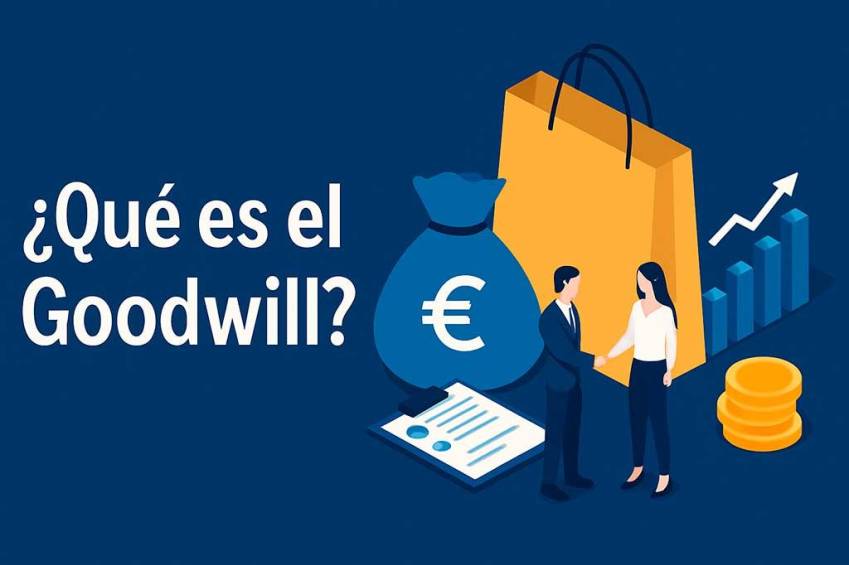
What is goodwill and why is it key in buying and selling businesses?
Goodwill, also known as business goodwill or intangible value, is that hidden asset that makes a company worth more than what its physical assets say on paper. It’s not magic, but it’s close. It’s the result of years of effort, reputation, loyal customers, a solid brand… all those things you can’t touch, but that heavily influence the value of a business.
In this article, we’ll walk you through what goodwill really means, how it’s calculated, why it can be a deal-maker in business sales, and how you can protect or even increase it if you already own a company. Because if you’re considering buying or selling a business in Spain, this is something you need to know. No doubt about it.
Definition of Goodwill or Business Value
Origin of the term and how it’s used in accounting and finance
The word goodwill comes from English, obviously, and literally means “good reputation” or “good standing.” But in the business and accounting world, it goes way beyond that. In Spanish accounting, fondo de comercio refers to the set of intangible elements that make a business worth more than the net value of its assets.
It’s mostly used during business acquisition deals, when the final purchase price exceeds the fair value of the company’s tangible assets. That difference, that “extra” that’s being paid, is what we call goodwill.
The difference between goodwill and tangible assets
This is where many people get confused. A commercial space, machines, computers, company vehicles… these are tangible assets. You can see them, touch them, and easily assign a value to them.
Goodwill, however, is based on factors like:
-
Brand reputation
-
Customer loyalty
-
Strategic business location
-
Consolidated team
-
Exclusive commercial agreements
-
Business history
It’s intangible, yes. But its impact on the final price of a company is very real.
How Is Goodwill Valued in a Business Transaction?
Methods to value goodwill
There’s no magic formula to calculate goodwill, but there are commonly accepted methods. The most straightforward is this:
Goodwill = Purchase price of the business – Fair value of net assets
Simple in theory. But to reach that “fair value,” you’ll need a thorough analysis, factoring in debts, hidden assets, amortizations, and more.
Other more complex methods include:
-
Future profitability approach (based on earnings projections)
-
EBITDA multiples (often used for tech companies)
-
Market comparisons with similar businesses
Factors that influence the value of goodwill
Goodwill isn’t a fixed number. It depends on:
-
The buyer’s perception of the business
-
The ability to generate future profits
-
The perceived level of risk
-
The industry sector (a café isn’t the same as an AI startup)
-
And of course, the economic and legal context
That’s why having good advisors by your side is absolutely key.
Real-Life Examples: When a Company Is Worth More Than Its Assets
When brand reputation or loyal customers make the difference
Picture a family-owned bakery in central Valencia, with 30 years of history, loyal customers, and a well-known brand in the neighborhood. Even if its physical assets (oven, furniture, cash register…) aren’t worth much, the business has a consolidated clientele, an impeccable reputation, and a respected name.
That, my friend, is goodwill in its purest form.
Tech startups with high intangible value
Here, goodwill often skyrockets. Some companies own barely any physical assets but are worth millions because of their technology, team, user base, or scalable business model.
Think of any startup acquired by a large corporation. What’s really being purchased is vision, talent, know-how, and future potential.
Franchises and businesses with strong local reputations
A business that belongs to a well-known franchise, has great online presence, excellent Google reviews, and a solid reputation on social media… that’s a business with high goodwill. The buyer isn’t just buying a store, they’re buying a position in the market.
The Importance of Goodwill When Buying or Selling a Company
How it affects the final price of a deal
Goodwill can be the difference between a decent offer and an irresistible one. If your company inspires trust, has a strong brand and satisfied clients, you can ask for more. Literally.
And if you’re the one buying, watch out: don’t overpay just for emotion. Always evaluate goodwill critically.
Tax and accounting implications of acquiring goodwill
Now comes the serious part. In Spain, goodwill can be tax-deductible in some cases, although there have been regulatory changes in recent years.
Also, it’s important to properly reflect this figure in the balance sheet, since it can affect taxes, future valuations, and the buyer’s financial reporting.
Key Strategies to Protect and Boost the Intangible Value of Your Business
How to enhance your brand, reputation and customer loyalty
If you already own a business, here are some ideas to strengthen your goodwill:
-
Focus on customer experience (beyond just selling)
-
Build your brand (yes, invest in your image)
-
Manage reviews and online reputation
-
Create repeatable and well-documented processes
-
Keep quality consistent over time
All of this matters. And it adds real value when the time to sell comes.
Why your team also adds to your goodwill
The people behind your company are also part of your goodwill. A committed, professional and well-trained team is a valuable intangible asset.
Buyers know this. And so should you.
Conclusion: The Hidden Value That Can Change the Game in a Business Deal
Goodwill is many things: reputation, history, loyal clients, trust, perception… but above all, it’s real value.
In today’s market, being able to identify, assess and manage goodwill can make the difference between a mediocre sale and a highly successful one. It’s as simple as that.
Are you thinking about buying or selling a business in Spain? Then don’t leave it to chance. Surround yourself with professionals who understand and know how to maximize goodwill. And if you’re looking for experienced help, this is a good place to start: Business in Spain.









